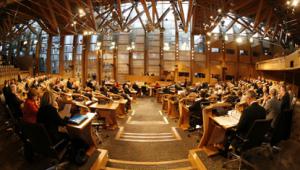By Keith Aitken in Edinburgh | 7 June 2013
The Scottish Government is to set up its own version of the Office for Budget Responsibility when it takes on new tax powers under the 2012 Scotland Act. The move follows MSPs’ concerns that poor OBR forecasting could leave Scotland out of pocket.
Finance Secretary John Swinney revealed the plan at a May meeting of Holyrood’s finance committee, where he described some of the OBR’s tax-yield projections as ‘inexplicable’. Ministers have also been angered by downbeat OBR forecasts of future North Sea revenues.
Swinney said: ‘My view is that Scotland requires an independent forecasting body to provide assessments to both the government and Parliament about what we will generate as a result of these taxes. I’m considering how that would be established.’ He added that he wanted the new body in place by the time the tax powers transfer.
The Scotland Act transfers control over UK stamp duty and landfill taxes from April 1, 2015, and power to set a Scottish Rate of Income Tax from April 2016. The SRIT will be offset by a reduction in Scotland’s block grant from Westminster, equivalent to 10p in the pound of revenues from standard ratepayers in Scotland.
Kenny Gibson, convener of the finance committee, told Public Finance that implementing the new arrangements would depend on both reliable revenue forecasting and equitable indexing that will take account of inflation and changes in the tax base.
‘We can’t just settle for a percentage of what’s happening in the UK, because we’re not going to get accurate forecasting, and that’s clearly an issue for us,’ Gibson said.
In the case of stamp duty, where the Scottish Government plans a more progressive tax regime – the Land and Buildings Transaction Tax – revenue projections relied on future property market activity. The committee’s belief, Gibson said, is that the OBR’s assumptions were heavily skewed towards market conditions in Southeast England.
‘The OBR takes the rather stubborn view that people will move house as often in the future as they have in the past, which seems unlikely given the state of the housing market,’ he said.
Similarly, the OBR was projecting a steady rise in landfill tax revenues, even though increased recycling is reducing the amount of material sent to landfill.
More importantly, the reduction in Holyrood’s block grant once the SRIT comes into force will be driven by a calculation of Scotland’s notional income tax yield.
The OBR, Gibson contended, had been ‘wildly over-optimistic’ about future earnings levels. His committee has also protested that the £40m-£45m bill for new Revenue & Customs systems to run SRIT is falling on Holyrood when the Act is UK legislation. There seems little prospect of Westminster yielding on that grievance, although there might be scope to negotiate costs down.
Gibson acknowledged a general will in both London and Edinburgh to make the new arrangements work, but said his committee was increasingly reconciled to working full-time on the reforms.
Meanwhile, Holyrood’s audit committee’s concerns about financial accountability under the Scotland Act reforms have eased, convener Iain Gray told PF. The committee had voiced fears that Audit Scotland would be unable to scrutinise HMRC’s performance in collecting the SRIT, or to summon senior officials to appear before it.
But HMRC permanent secretary Edward Troup, who is accountable for the SRIT, has now agreed to appear regularly before the Holyrood committee, and there were indications this would be given statutory force in next year’s Finance Bill, said Gray.





















